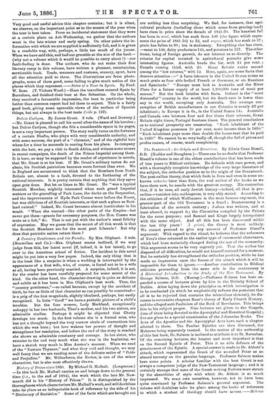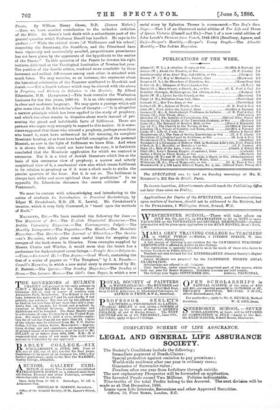The Pentateuch : its Origin and Structure. By Ed win
Cone Bissell, D.D. (Hodder and Stoughton.)—There can be no doubt that Professor Bissell's volume is one of the ablest contributions that has been made of late years to Biblical criticism. He defends with rare power, and with a thoroughly complete knowledge of the very large literature of the subject, the orthodox position as to the origin of the Pentateuch. The post-exilian theory, that which finds in Ezra and even in some un- known redactor later than Ezra, the real author of the books as we have them now, he assails with the greatest energy. His contention that, if it be true, all early Jewish history—indeed, all that is pre- exilian—vanishes into nothingness, is very ably stated. According to the criticism of which Wellhausen is the most famous exponent, the greater part of the Old Testament is a fraud ; Deuteronomy is a fabrication of the seventh century ; Joshua was written, and at least altered, to support it; the Chronicles compiled by the Priests for the same purpose; and Samuel and Kings largely interpolated with the same object. And all this has been discovered within the last fifty years ! A priori, the theory is most unlikely. We cannot pretend to give any account of Professor Bissell's argument. With regard to the ritual, he believes that the reformers of Ezra's time returned to the earlier type of ceremonial observance, which had been materially changed during the age of the monarchy. This argument seems to be very cogently put. That the author has disposed of all difficulties, he would not himself contend for a moment. But he certainly has strengthened the orthodox position, while he has made an impression upon the forces of the attack which it will be impossible for them to ignore.—Another contribution to Biblical criticism proceeding from the same side in the controversy is A Historical Introduction to the Study of the New Testament. By George Salmon, D.D. (Murray.)—Professor S Amon has here ex- panded a course of lectures given by him in the Divinity School of Dublin. After laying down the principles on which investigation is to be conducted (in which he emphatically refuses the postulate that all is to be rejected that contains the miraculous element), he dis- cusses in successive chapters Banes theory of Early Church History, and the alleged anti.Patilinism of the Book of Revelation. This brings him to his subject proper. Nine lectures are given to the Gospels, (one of them being devoted to the Apocryphal and Heretical Gospels) ; five are given to a special examination of the Juhannine Books. The Acts of the Apostles and the Apocryphal Acts have each a chapter allotted to them. The Pauline Epistles are then discussed, the Hebrews being separately treated. In the matter of the authorship of this last book, Dr. Salmon is inclined to attribute it to St. Barnabas. Of the remaining lectures, the longest and most important is that on the Second Epistle of Peter. This it an able defence of the genuineness of the Epistle. A special answer is made to Dr. Abbott's attack, which represented the Greek of the so-called Peter as an absurd travesty on the genuine language. Professor Salmon makes here some points. A scholar familiar with the best Greek is not always a competent judge of the New-Testament language ; and it is certainly strange that none of the Greek-writing Fathers were struck by the absurdities of style with which Dr. Abbott is so much impressed. We must own ourselves, however, not to have been quite convinced by Professor Salmon's general argument. The volume will doubtless take its place among the books of reference to which a student of theology should have access.—Hebrew Feasts. By William Henry Green, D.D. (James Nisbet.) —Hero we have another contribution to the orthodox criticism of the Bible. Dr. Green's book deals with a subordinate part of the general question which Professor Bissell has handled. He says in his preface :—" While the critical views [of Wellhausen and his school] respecting the Sanctuary, the Sacrifices, and the Priesthood have been vigorously and successfully assailed, proportionate prominence has not been given by the opponents of the hypothesis to the matter of the Feasts." To this question of the Feasts he devotes his eight lectures, delivered at the Theological Institution of Newton last year. The position of the hostile critics, rendered more assailable by their incessant and radical differences among each other, is attacked with much force. We may mention, as an instance, the argument about the historical celebration of the Passover attributed to Hezekiah and Josiah.—Yet a fourth volume which may be classed with the above is Prophesy and History in Relation to the Messiah. By Alfred Edersheim, D.D. (Longtnans.)—This book contains the Warburton Lectures for the five years, 1880-84. It is an able argument, stated in clear and moderate language. We may quote a passage which will give some idea of Dr. Edersheim's line of thought :—" It is altogether a narrow principle which has been applied to the study of prophecy, and which too often results in disputes about words instead of pre- senting the grand and indubitable facts of fulfilment. There are persons who argue very strangely in regard to this matter. It is some- times supposed that those who uttered a prophecy, perhaps even those who heard it, must have understood its full meaning, its complete Messianic bearing, or at least have had full conception of the personal Messiah, as now in the light of fulfilment we know Him. And when it is shown that this could not have been the case, it is forthwith concluded that the Messianic application for which we contend is erroneous. But it is a kind of Jewish literature which lies at the basis of this erroneous view of prophecy, a narrow and utterly unspiritual view of it, a mechanical view also which treats fulfilment in its relation to prophecy as if it were a clock made to strike the precise quarters of the hour. But it is not so. The fulfilment is always both wider and more spiritual than the prediction." In an appendix Dr. Edersheim discusses the recent criticism of the Pentateuch.



































 Previous page
Previous page